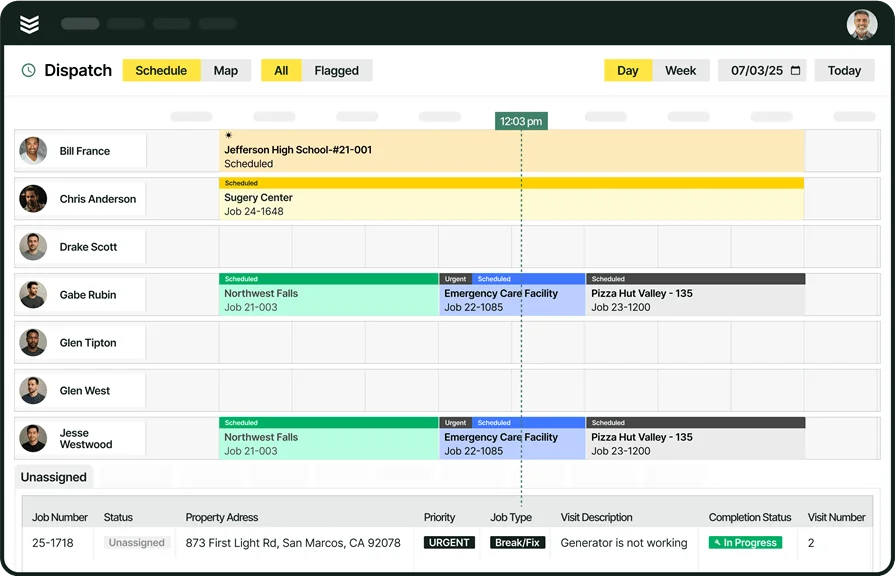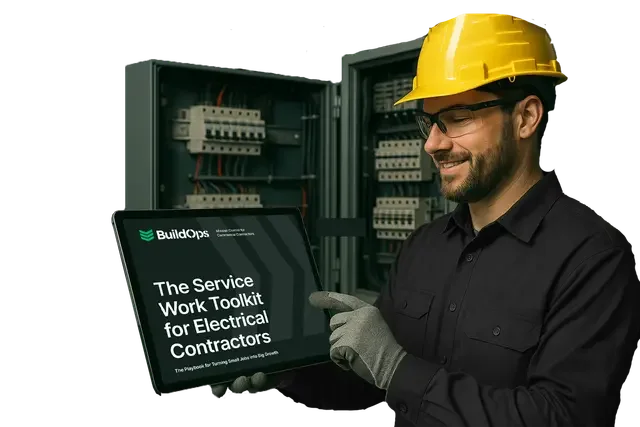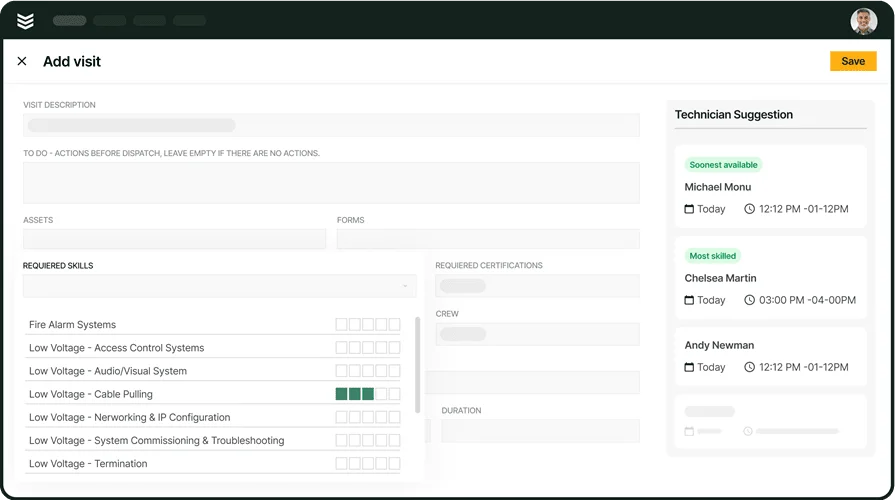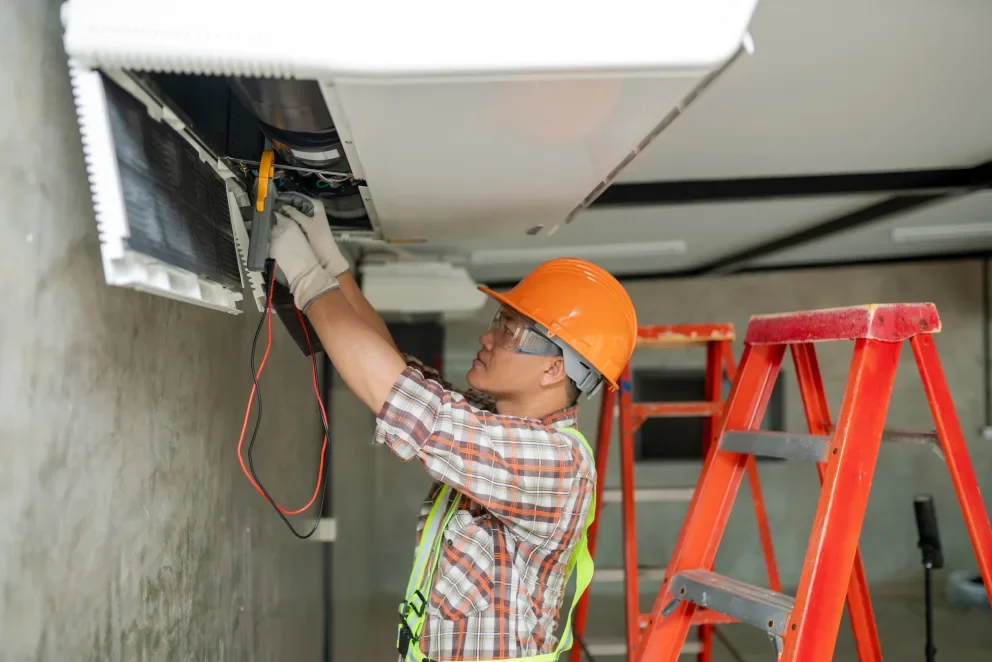Running electrical projects across multiple sites and crews takes precision. When drawings change mid-job or materials show up late, you need tools that can pivot fast—without losing track of the work already done. That’s where electrical construction software comes in. It keeps your bids tight, your scheduling clear, and your field teams moving without the constant back-and-forth. Whether you’re handling tenant fit-outs, power upgrades, or full builds, the right platform gives you full visibility from estimate to closeout.
If you’re in the electrical industry, and looking to keep crews productive while protecting profit margins, this guide breaks down the best construction software options for your team.
Here’s what you’ll find in this guide:
- How to choose electrical construction software that fits your team
- 5 key features for electrical construction software
- Best for commercial
- Best for residential
- Best for general contractors
- Other electrical construction software & platforms worth checking out
- 7 benefits of using construction software for electrical service work
- 4 important FAQs about construction software for electrical contractors
Looking for a proper construction software for electrical contractors starts with having a clear overview of how your jobs actually run. Don’t just follow what’s popular—find what lines up with how your field and office operate every day. Let’s break down what matters most when picking a platform.
How to choose electrical construction software that fits your team
Electrical construction brings a different level of complexity. You're wiring full builds, managing site coordination, ordering materials, handling inspections, and updating plans—all while keeping field crews aligned. This work goes far beyond basic electrical service. It requires tools designed for construction-level demands.
Electrical construction software should help your team stay in sync across every phase of the project. Crews in the field need instant access to updates. The office needs clear visibility on labor, materials, and progress. The software you use should match how your jobs operate every day. Here’s what to evaluate when looking at your options:
- Ease of use – Can your foreman log updates straight from the site without needing hours of training? Will your techs pull up drawings, material lists, or punch items while walking a job? Is the interface built for fast use in field conditions?
- Cost to value – Does the software improve quote accuracy, reduce field delays, or cut down on back-and-forth? Are the tools built around workflows your crews actually follow? Can it help you keep schedules tight and rework off the table?
- Integration and access – Will it connect with the systems your team already uses—like takeoff software, inventory tracking, or accounting tools? Can project managers and field crews view the same updates at the same time?
- Support and reliability – When issues come up, is there support from people who understand how electrical construction works? Is data stored securely and backed up automatically? Will updates keep your system steady during high-demand work?
- Features – Does it track project phases, manage change orders, and organize labor schedules? Can it attach field photos, inspection notes, and material checklists to each job file? Is everything built to support active field work from start to finish?
Many platforms support construction teams, but only a few actually deliver the tools electrical contractors need on active job sites. Before locking in a solution, it’s worth taking a closer look at the features that truly move the needle—from scheduling and tracking to documentation and field updates. Let’s break down the features that matter most when managing electrical projects and service calls.
5 key features for electrical construction software
Electrical contractors need tools that do more than organize data—they need systems that help crews stay productive on active job sites. When you're wiring full buildings, coordinating across trades, and managing labor and materials at scale, the right features in your electrical construction software become mission-critical.
Here are six must-have capabilities that support how construction teams actually work in the field.
1. Scheduling and dispatching that match jobsite chaos
Effective field coordination starts with field service scheduling and construction dispatch software that adapt fast. These tools help crews stay on time and ensure your office team stays informed without slowing things down.
Let’s say a concrete pour delays access to the main electrical room. Your scheduler shifts the rough-in crew to another area, updates the job in real time, and dispatches the team with new tasks before the truck even leaves the yard.
2. Quoting tools that move with project demands
Electrical construction work constantly shifts—from design tweaks to spec changes on the fly. That’s why responsive electrical construction quoting tools are vital. They allow you to revise scopes, attach labor and material costs, and send updates that reflect what’s actually happening on site.
For example, your estimator walks a job and finds that the feeder path must extend through an additional 60 feet of conduit. Instead of starting from scratch, they adjust the line item, log notes for the GC, and resend a full quote by the time they get back to the truck.
3. Mobile access for every technician
Crews need tools that work where the work happens. A technician mobile app gives field teams access to drawings, checklists, job notes, and updates—no office handoffs required.
Picture this: your tech shows up for a gear install and the panel layout has changed. Instead of calling in, they check the app, review the revised drawing, and confirm which circuits were rerouted—all while standing at the panel.
4. Invoicing and payments connected to field progress
With construction jobs, billing must match the progress. Invoicing software tied to work completed in the field—paired with payment processing—keeps cash flow steady without manual chasing.
Let’s say a rough-in phase wraps on a retail space. Your office sees the work marked complete by the lead tech, generates an invoice based on the updated scope, and sends it off—all before the tools hit the van.
5. Time tracking that supports real job costing
Tracking hours on construction projects helps with labor forecasting and cost control. With proper time tracking software, every crew hour links back to the task, phase, and project it came from.
Take a scenario where two crews are working on separate wings of a school build. One team wraps early, and the foreman reassigns them using live labor data. Later, the hours tie back to the quote, giving your PMs a clearer view of what each phase actually required.
Other valuable features of electrical construction software
Beyond the core tools used day to day, the best electrical construction software also includes features that support longer-term visibility and smoother handoffs across teams. These extras give electrical contractors a sharper view into their operations, especially when managing multiple jobs, trucks, and client accounts. They may not be used constantly, but they make a difference when the pace picks up.
- Fleet tracking tools - Fleet management software helps electrical contractors monitor service vehicles in real time, manage preventive maintenance, and reduce costly downtime across active job sites.
- Customer and project relationship tracking - An electrical construction CRM keeps job history, property details, and client interactions organized—so your team can manage repeat clients, follow-ups, and multi-phase projects without digging through paperwork.
- Service agreement automation - Service agreement tools support contractors managing long-term maintenance or compliance-based electrical work, with automatic scheduling, scope tracking, and billing tied to contract terms.
- Sales pipeline tracking - Pipeline tracking software gives electrical estimators and sales teams a clear view of where bids stand, which jobs are pending, and what needs attention—helping avoid missed follow-ups during busy project cycles.
While these features may not be part of the daily grind, they add serious value when you're managing high volumes, recurring work, or long project timelines. With the full picture in place, it’s time to break down which electrical construction software stands out—starting with a platform built for commercial contractors who need power, scale, and control across every phase.
Best for commercial electrical construction: BuildOps
For electrical contractors handling multi-phase builds, capital projects, and service work across multiple properties, BuildOps offers a dedicated platform built around the real workflows of electrical construction. The system connects estimating, field updates, labor tracking, and billing—so nothing gets lost between handoffs.
How pricing works: BuildOps offers custom pricing based on company size, number of users, and selected modules—giving teams flexibility to scale.
Features worth highlighting:
- Advanced scheduling and real-time crew dispatch
- Full project tracking with labor, costs, and material data
- Built-in change order management and documentation
- Cost forecasting, reporting, and progress billing
What sets it apart for commercial teams: BuildOps supports every stage of an electrical construction project—helping contractors manage field work and back-office tasks in one place, without relying on third-party plug-ins or extra apps.

See BuildOps in action
We help contractors manage complex installs, timelines, and project oversight.
Best for residential electricians: Fieldwire
Image Source: Fieldwire
Fieldwire is a field coordination platform focused on helping electrical crews manage tasks, drawings, and punch items directly from the jobsite. It works especially well for smaller teams who need to stay aligned without using multiple tools or heavy back-office setups. However, it may lack critical business tools like quoting, billing, or client management that growing construction teams depend on.
How pricing works: Fieldwire offers a free plan for basic use, with upgraded paid plans that unlock premium features depending on project scale and user roles.
Features worth highlighting:
- Drawing markup and version tracking
- Mobile punch list creation and issue tracking
- Field task assignments and completion status updates
What sets it apart for residential: Fieldwire simplifies fieldwork by giving techs a single place to view updates, submit progress, and track daily tasks.
Best for general contractors: Procore
Image Source: Procore
Procore is a full project management platform geared toward large construction teams. For electrical contractors working on high-volume commercial jobs, it offers deep integration with GC workflows, field documentation, and financial reporting. That said, it may feel oversized or complex for smaller electrical firms that need a more focused construction solution.
How pricing works: Procore uses a custom pricing model based on company size and selected features, typically designed for large or enterprise-level contractors.
Features worth highlighting:
- Construction drawing management and RFI tracking
- Submittals and change order documentation
- Budgeting, contract management, and reporting tools
What sets it apart for general contractors: Procore supports coordination across trades and phases, making it strong for electrical subs working on major construction projects.
Other electrical construction software & platforms worth checking out
Not every contractor has the same workflow, crew size, or project volume. That’s why there’s a wide range of electrical construction software on the market—some built for speed, others for documentation, takeoffs, or client communication. These platforms each offer something useful for the right team, especially if your focus leans toward estimating, service calls, or small to mid-sized jobs.
Knowify
Image Source: Knowify
Knowify supports small electrical contractors looking for a tool that blends job costing, invoicing, and client tracking into one platform. It offers a simplified dashboard and is ideal for firms that need to manage both construction projects and service work from one system. However, teams managing multi-phase electrical builds or large-scale commercial installs may find the platform lacks the depth required for complex coordination.
How pricing works: Knowify offers tiered monthly pricing with packages based on the number of users and access to advanced features.
Features worth highlighting:
- Estimating and change order tracking
- Time tracking and job costing tools
- Progress invoicing and contract management
What sets it apart: Knowify is built for smaller shops that want to manage service and construction under one roof without needing a massive rollout.
How it compares to BuildOps: See for yourself in our feature breakdown of Knowify vs BuildOps
STACK
Image Source: STACK
STACK is an estimating platform tailored to preconstruction teams. For electrical contractors, it focuses on fast takeoffs, material lists, and bid generation, making it a strong choice for estimators looking to speed up the quoting process. That said, it stops short of offering project management, scheduling, or crew tracking—so it works best when paired with other tools.
How pricing works: STACK offers a custom quote for each customer, based on use case and features needed for estimating and bidding.
Features worth highlighting:
- Cloud-based electrical takeoff tools
- Quantity tracking and cost calculations
- Bid proposal generation with saved templates
What sets it apart: STACK helps speed up estimating for contractors working on bid-heavy construction pipelines.
Trimble Construction One
Image Source: Trimble Accubid
Trimble Construction One is part of Trimble’s broader construction suite. For electrical contractors, it combines financial management, estimating, and resource planning—geared toward firms already operating at scale. However, smaller teams may face a steep learning curve or require dedicated admin resources to manage it fully.
How pricing works: Trimble requires custom quotes and often involves enterprise-level implementation.
Features worth highlighting:
- Advanced estimating with digital takeoff tools
- ERP-style financial and labor planning
- Job cost forecasting and reporting
What sets it apart: Trimble offers powerful tools for electrical contractors focused on financial visibility and long-term project planning.
Jobber
Image Source: Jobber
Jobber is designed for service-based contractors, including electrical teams that prioritize scheduling, client communication, and fast invoicing. It works well for residential or light commercial service calls. For contractors focused on full construction builds or multi-phase installs, the platform may lack the depth needed for labor tracking, project scope changes, or cost analysis.
How pricing works: Jobber offers tiered subscription plans, based on user access and the number of features selected.
Features worth highlighting:
- Online booking and customer reminders
- Invoicing and mobile payments
- Job checklists and status tracking
What sets it apart: Jobber keeps day-to-day field work organized and billing fast—great for techs who close out work on-site.
eSUB
Image Source: eSUB
eSUB is tailored specifically to subcontractors, including electrical teams. It provides document control, field reporting, and daily logs built for trade contractors working on larger projects with GCs. Firms needing end-to-end project management, quoting, or dispatch tools may need to connect eSUB with other platforms to complete the stack.
How pricing works: eSUB uses a quote-based model, with pricing dependent on features and number of users.
Features worth highlighting:
- Field documentation and daily reporting
- RFI, submittal, and change order tracking
- Labor productivity and budget comparison
What sets it apart: eSUB speaks the language of subcontractors and helps track field data without losing project scope or cost awareness.

Get the electrical contractor toolkit
Access leading strategies, real-life examples, and ready-made templates.
7 benefits of using construction software for electrical service work
Electrical contractors face tight timelines, shifting scopes, and high-pressure installs across complex builds. Good tools keep the chaos in check—but the best electrical construction software actually improves how crews work, how projects flow, and how money gets made. Here are the top benefits contractors experience when their field and office teams work off the same platform.
1. Faster field reporting and documentation
Crews need to document site conditions, safety notes, and daily progress while the job is still fresh. With reliable construction field report software, electrical contractors and techs can submit updates directly from the jobsite, keeping your office looped in without chasing paperwork. This creates a cleaner trail of job activity and helps prevent scope confusion down the line.
2. Cleaner handoffs between estimating and project teams
When quotes, labor assumptions, and specs flow into job management automatically, field teams avoid the misfires that come from rekeying data. With electrical contractor project management software, your crew gets a head start—with full access to scope, materials, and scheduling tied to the original bid. Fewer missed details, fewer phone calls.
3. Faster billing without backlogs
Delays in billing eat into cash flow and keep office staff tied up chasing down field notes. Using connected construction invoice software allows electrical teams to invoice from completed work logs—cutting down the time between job done and payment sent. It also keeps labor, materials, and scope changes accurate on every invoice.
4. Tighter inventory control across job sites
Keeping track of panels, conduit, and gear gets tough when jobs overlap and storage sits offsite. With integrated electrical inventory management, teams can see what’s in stock, what’s on order, and what’s already allocated to a specific project. That means fewer material delays and better cost tracking on installs.
5. More predictable project timelines
Scheduling isn’t just about dates—it’s about knowing when labor, subs, and inspections align. With smart scheduling tied into job progress and scope, foremen and PMs stay ahead of delays. This cuts down idle time, makes labor hours count, and gives your team space to deal with real jobsite issues before they bottleneck.
6. Better visibility into customer relationships
Tracking property history, past service, and contacts across jobs keeps your team sharp. A dedicated CRM for electrical contractors allows you to manage ongoing client work, tee up new bids, and respond with context—without digging through old files or emails.
7. Fewer mistakes during fast project turns
When your team handles multiple small-to-mid installs, it's easy for things to slip—wrong specs, outdated drawings, or missed change orders. Construction software that ties everything together—quotes, labor, documents, and field logs—reduces the chance of costly rework. It keeps your office and field speaking the same language across every job.
4 important FAQs about construction software for electrical contractors
Still comparing options? Here are four common questions electrical contractors ask when evaluating construction software for electrical contractors—especially for teams that bill across both service calls and project phases. Whether you're quoting work in the field or managing contracts from the office, the billing system you choose plays a big role in your workflow, accuracy, and cash flow.
These answers give you the clarity to move forward with confidence.
1. What is electrical construction software?
Electrical construction software helps contractors plan, track, and manage all parts of the job—from estimating and labor scheduling to material tracking and invoicing. Unlike general field service apps, this software focuses on the full scope of construction work, not just quick repairs or maintenance.
It connects field updates with office systems, allowing crews to submit job notes, complete tasks, and track hours while project managers oversee costs, progress, and change orders in real time. All-in-one construction software for electrical contractors also includes quoting tools, customer management, technician apps, and reporting dashboards—so no step gets lost between the bid and the final invoice.
2. How does electrical construction software work for field teams?
Most electrical construction platforms include a technician app or mobile access for jobsite use. This allows techs to view project timelines, open drawings, submit updates, and log time from wherever they are—whether wiring a new install or verifying conduit runs during inspection. Field input syncs with the office immediately, giving both teams a clear picture of job status without delays or repeated data entry.
This is especially important on construction-driven jobs, where scope changes, task handoffs, or inspections require fast updates that affect scheduling and billing.
3. Can electrical construction software handle service agreements?
Yes—many modern platforms are built with long-term contracts in mind. They allow you to set up recurring visits, track contract timelines, manage preventive work, and tie each visit to labor and material usage. When configured properly, electrical teams get automatic reminders and full reporting around agreement milestones.
This matters for contractors handling post-install support, panel inspections, or warranty service tied to larger construction projects. Keeping service agreements active and aligned with install history reduces errors and improves long-term client retention.
4. What are some best practices for using electrical construction software?
Getting the most from your platform means more than just logging in—it requires setting it up to reflect how your team actually works. From service tickets to large installs, these best practices help electrical contractors get value without extra admin work:
- Link quoting tools directly to job scheduling and labor tracking
- Let techs close out work through the mobile app to speed up invoicing
- Use template-based estimates for repeat install scopes
- Tag materials and labor by job phase to improve cost tracking
- Set up auto-reminders for upcoming service agreements or inspection dates
- Track time by task, not just day, to reduce labor overages
- Pull reports weekly to flag projects drifting off schedule or budget
- Connect your CRM so all client and property data stays tied to the project
- Standardize naming conventions across drawings, jobs, and reports
- Review software settings monthly to fine-tune permissions, forms, and workflows
Construction jobs move fast, and electrical teams don’t have time to chase down schedules, rewrite quotes, or piece together reports from five different apps. Whether you’re managing tenant fit-outs, large commercial builds, or service contracts tied to past installs, the software you use needs to keep up. The best electrical construction software supports your workflow—not just by storing data, but by helping your field and office crews stay aligned through every phase of the job.
An all-in-one platform built for electrical construction gives contractors the visibility, control, and flexibility they need to finish jobs strong. If your work spans quoting, dispatch, labor tracking, and billing—especially across commercial service and install projects—investing in a system that ties it all together makes every hour count.

Curious how BuildOps helps?
We help electricians book more projects—and get paid on time.








